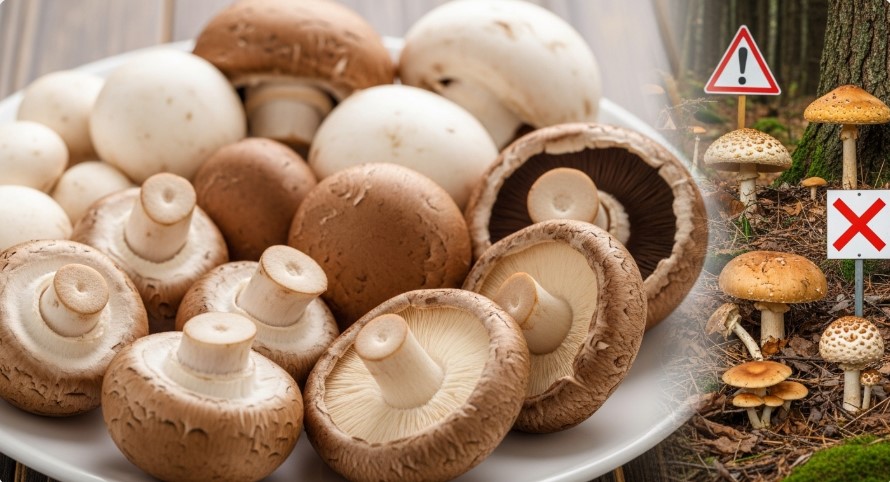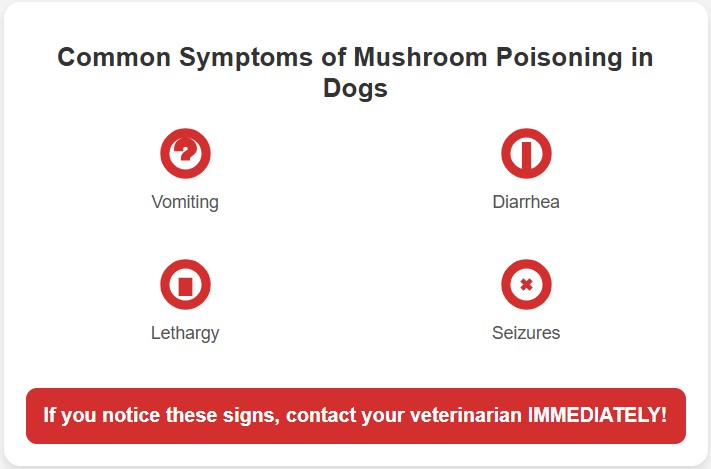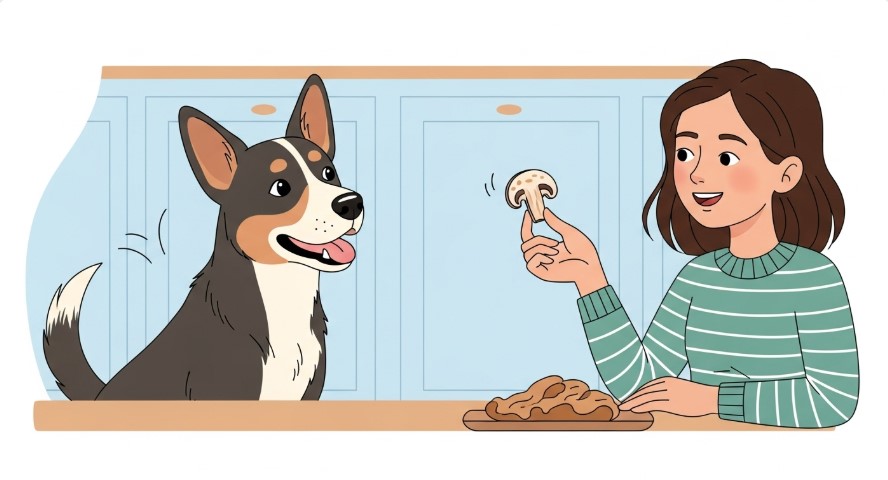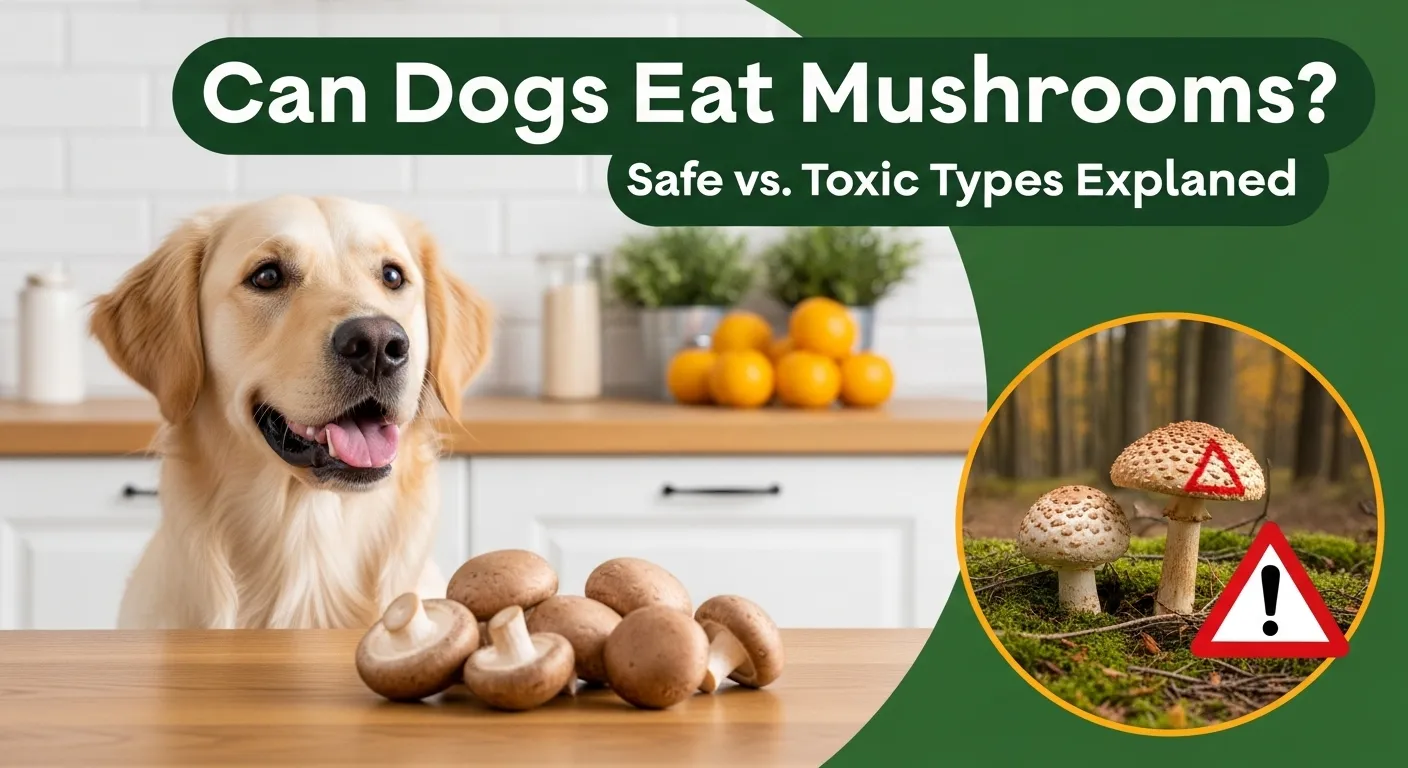Mushrooms are a popular ingredient in many human dishes, but when it comes to our furry friends, the question arises: can dogs eat mushrooms? The answer depends on the type of mushroom. While some mushrooms are safe and even beneficial for dogs, others can be extremely toxic and even fatal. This comprehensive guide explores the safe and toxic types of mushrooms, symptoms of poisoning, and how to keep your dog safe.
Can Dogs Eat Store-Bought Mushrooms?
Yes, dogs can eat store-bought mushrooms, such as button, portobello, shiitake, and cremini, as long as they are plain and cooked properly. These mushrooms are generally safe for dogs and can be a healthy addition to their diet in moderation. However, it’s important to ensure that the mushrooms are free from any seasonings, oils, butter, garlic, onions, or other ingredients that could be harmful to dogs.
- Key Tips for Feeding Mushrooms:
- Cook them plainly (sauté or boil without additives).
- Start with small amounts to see how your dog reacts.
- Use moderation—mushrooms should be a treat, not a staple.

The Dangers of Wild Mushrooms
Wild mushrooms can be highly toxic to dogs. There are thousands of species of wild mushrooms, many of which are poisonous. Some common toxic wild mushrooms include:
- Amanita phalloides (Death Cap)
- Galerina marginata (Deadly Galerina)
- Amanita gemmata (Jeweled Death Cap)
- Amanita muscaria (Fly Agaric)
- Gyromitra species (False Morel)
- Inocybe species (Fibrecap)
- Clitocybe dealbata (Ivory Funnel)
These mushrooms can cause a range of symptoms, from mild gastrointestinal upset to severe organ failure and death. Since it’s nearly impossible for the average person to identify toxic mushrooms accurately, it’s best to assume that all wild mushrooms are potentially dangerous and keep your dog away from them.
Symptoms of Mushroom Poisoning in Dogs
If your dog ingests a toxic mushroom, symptoms can vary depending on the type of mushroom and the amount ingested. Common symptoms include:
- Vomiting
- Diarrhea
- Drooling
- Lethargy
- Weakness
- Ataxia (loss of coordination)
- Seizures
- Organ failure (liver or kidney)
- Coma
- Death
Symptoms may not appear immediately and can take several hours or even days to manifest, depending on the mushroom species.

What to Do If Your Dog Eats a Wild Mushroom
If you suspect your dog has eaten a wild mushroom, it’s crucial to act quickly:
- Identify the Mushroom (if possible): If you can safely collect a sample or take a clear photo of the mushroom, do so. This can help veterinarians identify the type and determine the appropriate treatment.
- Contact Your Veterinarian or Pet Poison Control: Call your vet or a pet poison control center immediately, such as the ASPCA Animal Poison Control Center at (888) 426-4435. Do not wait for symptoms to appear, as some mushrooms can cause delayed but severe reactions.
- Do Not Induce Vomiting Without Guidance: Only induce vomiting if instructed by a professional, as it may not be safe in all situations.
- Bring Your Dog to the Vet: Follow the advice of the veterinarian or poison control center. Treatment may include inducing vomiting, administering activated charcoal, intravenous fluids, and supportive care.
Safe Ways to Feed Mushrooms to Your Dog
If you want to give your dog store-bought mushrooms, follow these guidelines:
- Cook Them Plainly: Sauté or boil the mushrooms without any oils, butter, or seasonings.
- Start Small: Introduce mushrooms gradually to see how your dog reacts. Some dogs may not like the taste or texture.
- Moderation is Key: Mushrooms should be a treat, not a staple in your dog’s diet. Too much can cause digestive upset.

Health Benefits of Mushrooms for Dogs
Store-bought mushrooms offer several nutritional benefits:
- Vitamins: Rich in B vitamins, which support energy metabolism, and vitamin D, which is important for bone health.
- Minerals: Contain selenium, potassium, and zinc, which are essential for various bodily functions.
- Antioxidants: Help combat oxidative stress and support overall health.
- Fiber: Aids in digestion and can help dogs feel full.
Additionally, some medicinal mushrooms like Turkey Tail, Lion’s Mane, and Reishi have been studied for their potential health benefits, such as boosting the immune system and supporting cognitive function. However, these should only be given under the guidance of a veterinarian, as they may interact with other medications or have specific dosing requirements.
Preventing Mushroom Poisoning
Prevention is the best way to keep your dog safe from mushroom toxicity:
- Keep Your Yard Clear: Regularly check your yard for wild mushrooms and remove them promptly.
- Use a Leash: When walking in areas where wild mushrooms may grow, keep your dog on a leash to prevent them from eating anything they shouldn’t.
- Supervise Outdoor Time: Always watch your dog when they are outside, especially in wooded or grassy areas where mushrooms are common.
- Educate Yourself: Learn to recognize common toxic mushrooms in your area, but remember that identification can be tricky, so when in doubt, assume it’s toxic.
Conclusion
In summary, while store-bought mushrooms can be a safe and healthy treat for dogs when prepared properly, wild mushrooms pose a significant risk and should be avoided entirely. Knowing the difference between safe and toxic mushrooms, recognizing the symptoms of poisoning, and taking immediate action if your dog ingests a wild mushroom can save their life. Always prioritize your dog’s safety and consult with your veterinarian if you have any concerns about their diet or health.
FAQ
Q: Can dogs eat cooked mushrooms?
A: Yes, as long as they are plain and cooked without any harmful ingredients like garlic, onions, or excessive salt.
Q: What should I do if my dog eats a wild mushroom?
A: Contact your veterinarian or a pet poison control center immediately. Do not wait for symptoms to appear.
Q: Are all wild mushrooms poisonous to dogs?
A: Not all, but many are, and it’s impossible to tell without expert knowledge, so it’s best to assume they are all toxic.
Q: Can puppies eat mushrooms?
A: Puppies can eat small amounts of safe, store-bought mushrooms, but introduce new foods gradually and in moderation.
Q: Are there any health benefits to feeding mushrooms to dogs?
A: Yes, mushrooms can provide vitamins, minerals, and antioxidants, but they should not replace a balanced dog food diet
